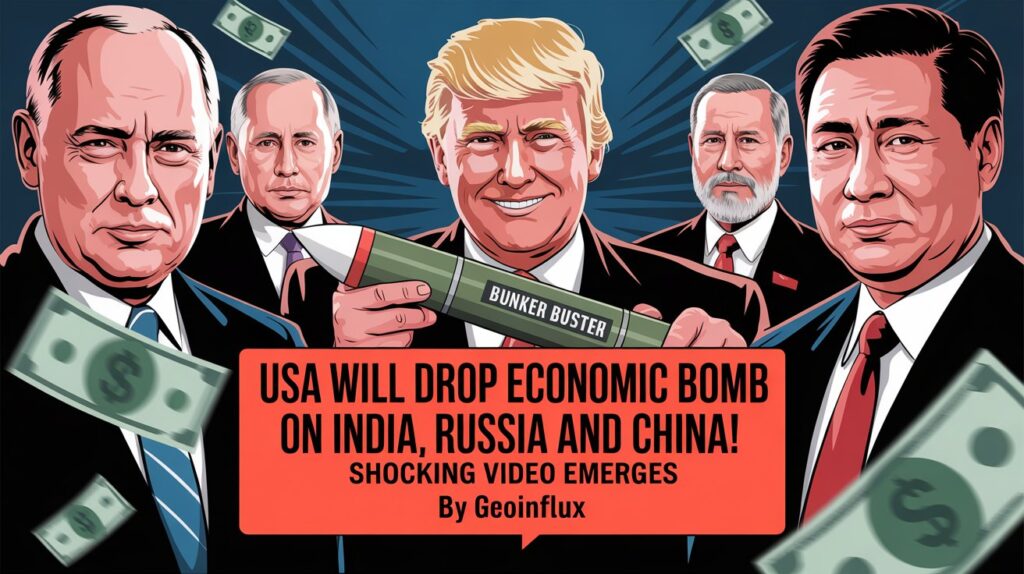Discover how proposed US sanctions on India over Russian oil imports could reshape global alliances, energy security, and India-US relations. A critical geopolitical analysis.
🧭 Introduction: Are US Sanctions on India a Real Possibility?
The geopolitical ground is shifting fast. A recent statement by US Senator Lindsey Graham about an “economic bunker buster” bill has triggered global alarm.
The legislation, if passed, would target countries purchasing Russian oil, gas, or uranium—and prominently features US sanctions on India as a consequence of its growing energy ties with Moscow.
This development could severely impact India’s foreign policy, energy security, and long-term strategic posture.
📜 What Is the “Economic Bunker Buster” Bill?
The proposed US sanctions bill seeks to:
- Punish any country buying energy resources from Russia.
- Impose economic sanctions and global trade restrictions.
- Treat India, China, and Russia as strategic violators.
🔍 US sanctions on India would come at a time when India is already doubling Russian oil imports to hedge against instability in the Middle East.
Interestingly, Pakistan, which recently imported Russian gas, is not explicitly mentioned in the bill. This suggests selective enforcement potentially influenced by Donald Trump’s preferences.
🇮🇳 Why India Is Vulnerable to US Sanctions Right Now
🔺 India’s Dependence on Russian Oil
India has significantly increased its energy imports from Russia in recent years. Reasons include:
- Avoiding fallout from Strait of Hormuz tensions, where Iran has threatened to block oil passage.
- Energy diversification to reduce over-dependence on Gulf nations.
- Price advantage and logistical convenience.
India’s officials argue that their Russian oil strategy protects national energy security, not geopolitical allegiance.
❌ Why US Oil Is Not an Alternative
Even if Washington asks India to shift to American energy exports, practical challenges include:
- Longer shipping times
- Higher freight costs
- Uncertainty about supply volumes
These factors make US energy imports unrealistic as a complete replacement for Russian oil, especially during crises.
🧠 Why the US May Still Target India
Despite growing strategic cooperation, many American lawmakers:
- View India through the same lens as China and Russia.
- Believe India’s rise could challenge US global dominance.
- Remain skeptical of India’s non-alignment on Ukraine and Iran.
As one US economist warned, “When India becomes strong enough, the US will treat it the same way it treats Russia now.”
💬 Trump’s Cold Shoulder
Trump’s administration may feel India has:
- Not reciprocated by buying US defense hardware like the F-35.
- Failed to flatter him diplomatically, unlike Pakistan which nominated him for the Nobel Peace Prize.
These factors may fuel Trump-era resentment, making US sanctions on India more likely under a second Trump term.
🌏 What Happens If the US Sanctions India?
🔗 The RIC Alliance May Re-Emerge
If sanctions are imposed:
- India may draw closer to Russia and China.
- A revival of the RIC (Russia-India-China) trilateral becomes likely.
- The multipolar global order may accelerate, diminishing US influence.
Russia’s foreign minister has already spoken in favor of reviving the RIC format, sensing shared pressure from Washington.
Ironically, US sanctions on India could drive Delhi closer to the very powers the US seeks to isolate.
📊 Recap: US Sanctions on India – Key Points
| Issue | Details |
|---|---|
| Main Trigger | India’s oil and gas imports from Russia |
| Proposed by | US Senator Lindsey Graham |
| Main Threat | Economic sanctions and global trade barriers |
| India’s Challenge | Balancing energy needs with strategic autonomy |
| Ripple Effect | Potential RIC revival and weakened Indo-US ties |
🧩 Conclusion: Can US-India Relations Survive This?
As US lawmakers push for this new sanctions regime, India faces a geopolitical dilemma:
- Bend under Washington’s pressure and risk energy insecurity, or
- Assert sovereignty and risk economic punishment from a key partner.
The coming months will be pivotal. For now, the world watches as US sanctions on India evolve from rhetoric into policy — or possibly, diplomacy prevails.





Pingback: India vs NATO: 5 Bold Moves That Expose the West’s Double Standards and Spark RIC Revival - GeoInflux
Pingback: EU India Sanctions Showdown: Nayara Refinery Hit in Power Move Over Russian Oil Ties
Some genuinely good posts on this website, thanks for contribution. “Be absolutely determined to enjoy what you do.” by Sarah Knowles Bolton.
Thank you for some other excellent post. The place else could anyone get that kind of information in such a perfect manner of writing? I have a presentation subsequent week, and I am on the look for such information.
Wow that was strange. I just wrote an very long comment but after I clicked submit my comment didn’t appear. Grrrr… well I’m not writing all that over again. Anyhow, just wanted to say wonderful blog!
hello!,I like your writing so much! share we communicate more about your article on AOL? I need an expert on this area to solve my problem. May be that’s you! Looking forward to see you.